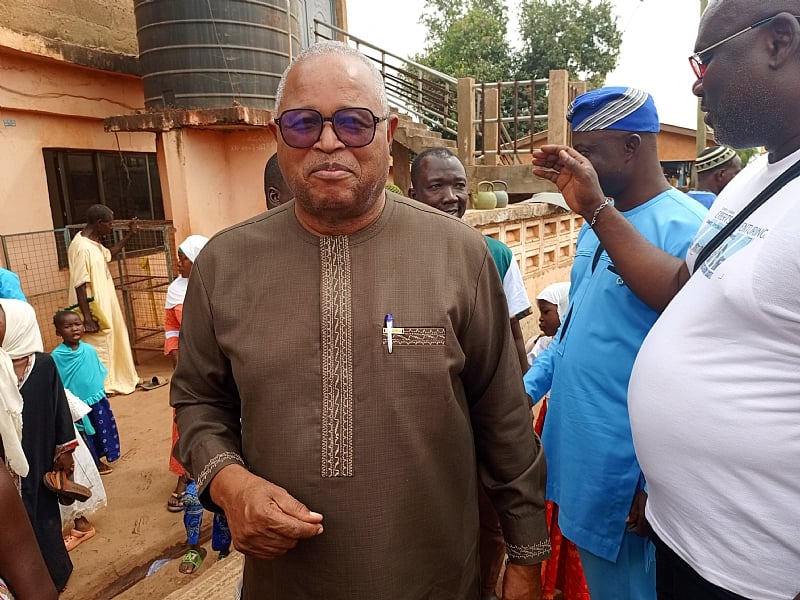The violent rainstorm that ravaged parts of the Nandom Constituency in Ghana’s Upper West Region on Friday, June 13, 2024, left a trail of devastation, impacting hundreds of lives and highlighting the vulnerability of the region to extreme weather events. The storm, characterized by its unexpected intensity and destructive force, caused widespread damage to homes, businesses, and public infrastructure, leaving many residents displaced and struggling to cope with the aftermath. Over 100 houses in Tuopare, the worst-hit community, were either completely leveled or had their roofs ripped off, exposing families to the elements. Guo, Tokuu, and Ko also suffered significant damage, with dozens of homes impacted. The storm’s destructive path extended beyond residential areas, affecting market stalls, business premises, and essential public infrastructure, including electricity poles and cables, further disrupting the lives and livelihoods of the affected communities.
The scale of the damage prompted an immediate response from Hon. Richard Kuuire, the Member of Parliament for Nandom, who expressed profound concern for the affected communities and pledged swift action to provide relief and support. He described the disaster as a stark reminder of the region’s vulnerability to extreme weather conditions and a clear indication of the urgent need to address the realities of climate change. Kuuire’s immediate priority has been coordinating with local authorities, traditional leaders, and relevant agencies to mobilize emergency relief efforts for the displaced families. This coordinated approach aims to ensure that essential resources such as temporary shelter, food, water, and medical supplies reach those in need as quickly as possible. The MP also recognized the psychological impact of the disaster and emphasized the importance of providing emotional support to help affected individuals cope with the trauma and loss.
Beyond immediate relief efforts, Kuuire plans to raise the issue on the floor of Parliament on Tuesday, June 17, 2024, to bring national attention to the plight of the affected communities and secure additional support for their recovery and rehabilitation. He intends to advocate for national resources to be allocated to rebuilding efforts and to develop long-term strategies to mitigate the impact of future disasters. The MP’s appeal for support extends beyond government channels. He has called upon individuals, businesses, and philanthropic organizations to join the collective effort to provide assistance to the affected communities. This call for collective action underscores the magnitude of the challenge and the need for a united front to support those who have lost their homes and livelihoods.
Kuuire’s response to the disaster goes beyond immediate crisis management. He has emphasized the critical need to integrate climate resilience into local development strategies, recognizing that such events are likely to become more frequent and intense due to climate change. This proactive approach involves investing in infrastructure that can withstand extreme weather events, developing early warning systems, and educating communities on disaster preparedness. He sees the disaster not just as an isolated incident, but as a wake-up call to prioritize climate action and invest in sustainable solutions that protect both the environment and the communities within his constituency. This long-term perspective highlights the MP’s commitment to addressing the root causes of vulnerability and building more resilient communities.
The Nandom Constituency, located within the Upper West Region of Ghana, is particularly susceptible to the impacts of climate change. This region, characterized by its predominantly agrarian economy, is highly dependent on predictable rainfall patterns for successful harvests. Changes in these patterns, including increased frequency and intensity of droughts and floods, pose a significant threat to food security and livelihoods. The recent rainstorm further underscores this vulnerability, demonstrating the devastating impact that extreme weather events can have on communities that lack the resources and infrastructure to cope with such shocks. The destruction caused by the storm is not just a physical setback but also an economic and social crisis, potentially exacerbating existing inequalities and pushing vulnerable households further into poverty.
The incident in Nandom resonates with broader concerns about the increasing frequency and intensity of extreme weather events globally, which are widely attributed to climate change. Kuuire’s call for action reflects a growing consensus among stakeholders, including government officials, scientists, and civil society organizations, that urgent and comprehensive climate action is essential. This action must include measures to mitigate climate change by reducing greenhouse gas emissions, as well as strategies to adapt to the unavoidable impacts of a changing climate. For vulnerable communities like those in the Nandom Constituency, adaptation measures, including strengthening infrastructure, improving early warning systems, and diversifying livelihoods, are particularly crucial for ensuring their long-term survival and prosperity. The disaster serves as a poignant reminder of the human cost of climate change and the urgent need for global cooperation to address this existential threat.


